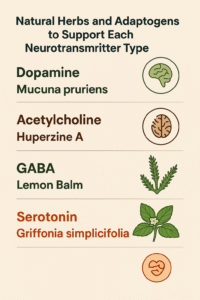Neurotransmitter balance can be supported not just by diet and lifestyle—but also by specific herbs and adaptogens. Each neurotransmitter has herbal allies that can enhance its production or receptor sensitivity. Incorporating these can be a gentle, natural way to shift your brain chemistry.
Dopamine – Mucuna pruriens
This tropical legume contains natural L-Dopa, the direct precursor to dopamine. It’s been used in Ayurvedic medicine for centuries to treat neurological conditions. Modern studies confirm its efficacy in boosting dopamine and improving mood, focus, and motivation. Source: Manyam, 2004
Acetylcholine – Huperzine A
Derived from Chinese club moss, huperzine A is a potent acetylcholinesterase inhibitor. This means it prevents the breakdown of acetylcholine, increasing its levels in the brain. It’s often used to support memory, focus, and learning. Source: Wang et al., 2009
GABA – Lemon Balm (Melissa officinalis)
This calming herb enhances the activity of GABA receptors, reducing anxiety and promoting restful sleep. It’s particularly useful for GABA-deficient individuals who are prone to overstimulation and worry. Source: Kennedy et al., 2002
Serotonin – Griffonia simplicifolia
This West African plant is a natural source of 5-HTP, the precursor to serotonin. Supplementing with 5-HTP can help relieve symptoms of depression, promote better sleep, and stabilize mood. Source: Birdsall, 1998
How to Integrate Herbs Safely
- Start with low doses and observe your body’s response
- Cycle adaptogens every few weeks to avoid tolerance
- Consult a healthcare provider if taking prescription medications
In Summary
Herbs are powerful tools to fine-tune neurotransmitter activity. Understanding your Braverman Test results can guide your herbal choices and promote long-term mental clarity and emotional balance.
